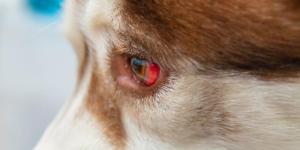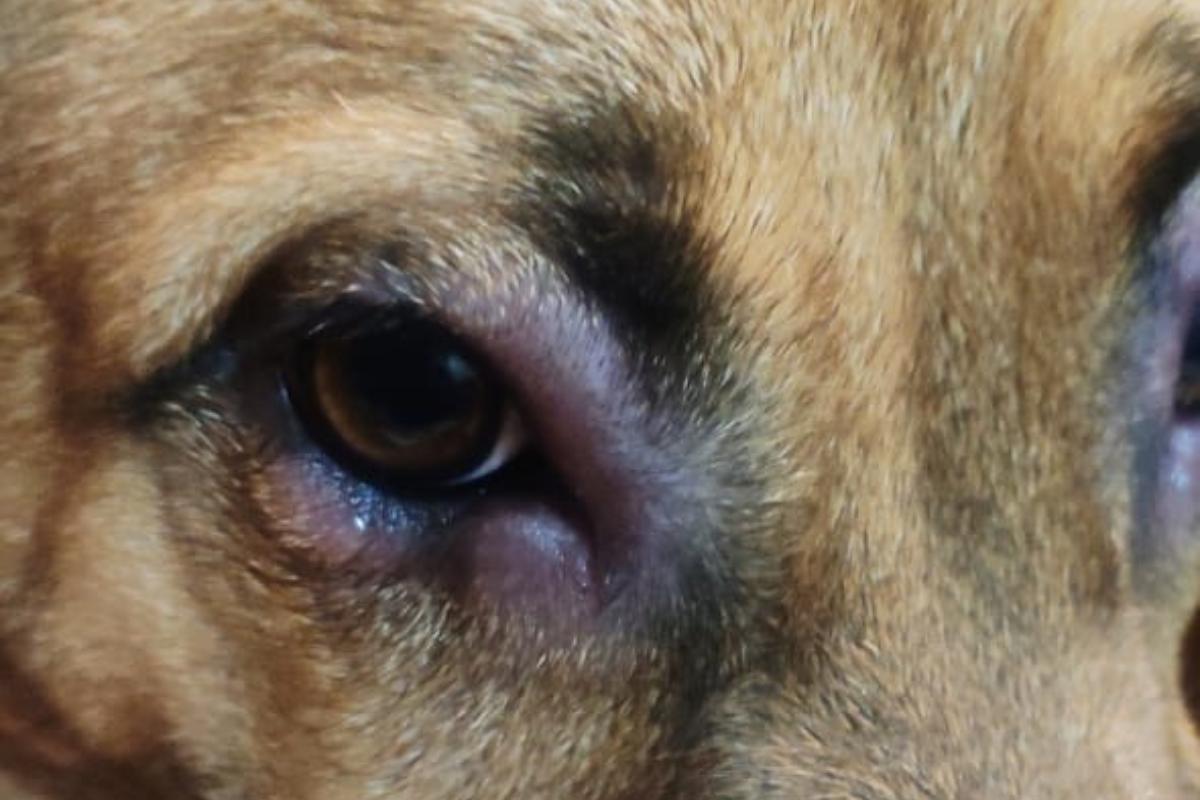Why Is My Dog’s Eye Swollen?



See files for Dogs
Swollen eyes in dogs can be a common and worrying sight for pet owners. This condition can be caused by various factors, ranging from minor issues to more severe underlying conditions. It is important for pet owners to understand the different causes and symptoms of swollen eyes in dogs, as well as the appropriate treatments. Early detection and treatment of any underlying condition can greatly improve the chances of successful treatment and recovery for the dog.
In this article, we will explore the various causes of swollen eyes in dogs and the recommended treatment to alleviate this condition.
Why does my dog have a swollen eye?
When a pet owner notices that their dog's eye appears swollen, it is crucial to determine whether the eye has actually increased in size or if it is simply protruding from the eye socket. The medical term for an increase in the size of the eyeball is "buphthalmia," while the term for its forward displacement is "exophthalmia." Let us take a closer look at each condition.
Buphthalmia
Buphthalmia in dogs is a condition in which the eyeball of the dog has actually increased in size. It is often caused by glaucoma, a condition in which there is an increase in intraocular pressure above normal levels. In these cases, the increased pressure stretches the collagen fibers that form the sclera and cornea, causing the eyeball to become distended or enlarged.
Buphthalmia can also be caused by other eye conditions, such as cataracts or retinal detachment. If left untreated, buphthalmia can lead to irreversible damage to the eye and even blindness.
Exophthalmia
Exophthalmia in dogs refers to the forward displacement of the eyeball from its normal position within the eye socket or orbit. In dogs, the orbit – the bony cavity that houses the eyeball – is not solely composed of bones. Rather, it is also comprised of soft tissues such as the masseter muscles and the zygomatic salivary gland. When these elements become affected, the result is exophthalmia, wherein the affected tissue occupies space within the orbit and pushes the eyeball forward.
Specifically, exophthalmia in dogs can be produced by four processes:
- Orbital cellulitis: Orbital cellulitis in dogs is an inflammation, initially diffuse, usually caused by bacterial infection, which can penetrate through the conjunctiva, eyelid, or soft palate. It can also occur as a result of a major trauma or extension of infectious processes in other nearby regions, such as the nasal sinuses or the last upper molar. The inflammation can eventually produce a retrobulbar abscess.
- Retrobulbar tumor: A retrobulbar tumor in dogs is a type of tumor that develops behind the eyeball within the orbit. These tumors can arise from various tissues within the orbit, such as the bone, muscle, or nerve tissue. Common types of retrobulbar tumors in dogs include meningiomas, neurofibromas, and adenocarcinomas.
- Mucocele of the zygomatic gland: is a condition that occurs when the duct of the zygomatic salivary gland becomes obstructed, leading to the accumulation of saliva within the gland. This accumulation causes the gland to enlarge and form a fluid-filled sac, which is called a mucocele. The zygomatic gland is one of the major salivary glands in dogs and is located near the eye, between the zygomatic bone (cheekbone) and the ear canal. When the duct of the gland becomes obstructed, the saliva produced by the gland cannot flow out and accumulates within the gland, causing it to swell.
- Myositis of the masticatory muscles: also known as masticatory muscle myositis (MMM), is an autoimmune disease that affects dogs. This condition is characterized by inflammation and damage to the masticatory muscles, which are responsible for chewing and jaw movement. In MMM, the dog's immune system mistakenly attacks and damages the muscles that control chewing. This results in pain and difficulty with opening the mouth, chewing, and swallowing.
All the aforementioned conditions mentioned earlier impact the space in and around the orbit, causing the eyeball to displace rostrally, resulting in a swollen or bulging appearance.
However, there is another condition that can also lead to puffy eyes in dogs, which is insect bites. Bites from insects like wasps or bees on the tissues surrounding the eye, such as eyelids, can trigger an inflammatory response, resulting in swelling around the periocular area.
Make sure not to overlook this other article on what to do if your dog's eye has popped out of its socket.
Symptoms of swollen eyes in dogs
Both buphthalmia and exophthalmia are important clinical signs that are usually accompanied by other symptoms in dogs. Let us take a closer look at the most common symptoms of both processes:
Buphthalmia is often seen in cases of chronic glaucoma, which is characterized by prolonged high intraocular pressure and often results in irreversible loss of vision. The most common symptoms include:
- Bulging or protruding eyes
- Redness or irritation in the eyes
- Excessive tearing or discharge from the eyes
- Swelling around the eyes or eyelids
- Difficulty closing the eyes
- Decreased vision or blindness
- Head shaking or rubbing of the eyes
- Changes in behavior, such as irritability or depression
Exophthalmia, on the other hand, is associated with a variety of clinical signs depending on its underlying cause. Dogs with exophthalmos generally exhibit:
- Bulging or protruding eyes
- Redness or irritation in the eyes
- Swelling around the eyes or eyelids
- Difficulty closing the eyes
- Decreased vision or blindness
- Head shaking or rubbing of the eyes
- Blood or other discharge from the eyes
- Abnormal positioning of the third eyelid
- Facial injuries, such as lacerations or fractures
Finally, the following symptoms are indicative of insect bites, which are also a common cause of swollen eyes in dogs.
- Swelling around the eyes, including eyelids, eyebrows, and the surrounding skin
- Redness or irritation in and around the eyes
- Itching or scratching of the affected area
- Inflammation or sensitivity to touch around the affected area
- Pain or discomfort in the affected area
- Presence of bite marks or stings on the skin around the eyes
In some cases, an insect bite around the eyes can also cause a more severe allergic reaction, resulting in symptoms such as facial swelling, difficulty breathing, and shock.
You might be interested in this other article on symptoms, treatment, home remedies for dogs with food allergies.

Treatment for the swollen eye in dogs
Understanding the underlying causes of clinical signs is crucial when it comes to treating a dog's swollen eye. The appropriate treatment plan will depend on the specific trigger that has caused the symptoms to manifest. Therefore, a proper diagnosis is necessary before beginning any treatment.
Let us take a closer look at the treatment options for each of the conditions presented above:
Buphthalmia
The treatment of buphthalmia typically involves medical management to reduce the intraocular pressure, as well as surgical intervention in some cases. Medications such as topical or systemic glaucoma drugs, anti-inflammatory drugs, and pain relievers may be prescribed to manage the condition.
In cases where medical management is not effective, surgical procedures such as cyclophotocoagulation or gonioimplantation may be recommended to reduce intraocular pressure. In severe cases, enucleation (removal of the eye) may be necessary to prevent further damage to the eye and surrounding tissues.
Exophthalmia
The treatment of exophthalmia typically involves stabilizing the patient and providing supportive care. This may include administering pain medication, antibiotics to prevent infection, and fluids to maintain hydration. In some cases, the patient may need to be sedated or anesthetized to facilitate treatment.
Once the patient is stable, the underlying cause of the exophthalmia will need to be identified and treated. Depending on the cause, this may involve surgical intervention, such as repositioning the eye(s) back into their sockets, removing a tumor or abscess, or repairing a fracture of the eye socket or surrounding bones.
Insect bites
The first step in treating insect bites in a dog's eyes is to remove any remaining insect parts or stingers that may be present. This can be done using tweezers or by gently flushing the eye with saline solution.
Next, a cold compress can be applied to the affected eye to help reduce swelling and discomfort. A clean, damp cloth or a bag of frozen vegetables wrapped in a towel can be used as a cold compress.
If the swelling and discomfort persist, or if there are signs of infection such as discharge or redness, it is important to seek veterinary care. The veterinarian may prescribe topical or oral medications to reduce inflammation and pain, and to prevent or treat any secondary infections.
In severe cases, such as those involving an allergic reaction or multiple bites, hospitalization may be necessary to provide more aggressive treatment and monitoring.
Make sure not to miss this informative article that explains the possible causes of blood in your dog's eye.
This article is purely informative. AnimalWised does not have the authority to prescribe any veterinary treatment or create a diagnosis. We invite you to take your pet to the veterinarian if they are suffering from any condition or pain.
If you want to read similar articles to Why Is My Dog’s Eye Swollen?, we recommend you visit our Eye problems category.






